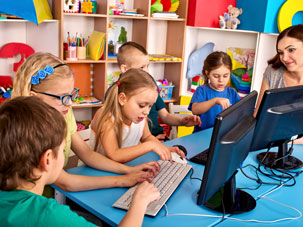
How to care for your children’s eyesight? 4 practical tips |
| 02.12.2019 |
 The number of people with vision defects increases every year, and children constitute a significant part of this group. Here are four simple tips which will help you to take proper care of your kids’ eyesight. After all, we are all willing to go to any lengths to let them enjoy good eyesight throughout their lives, aren’t we?
The number of people with vision defects increases every year, and children constitute a significant part of this group. Here are four simple tips which will help you to take proper care of your kids’ eyesight. After all, we are all willing to go to any lengths to let them enjoy good eyesight throughout their lives, aren’t we?
To begin with – make sure there is adequate lighting in the child’s room. This is a multi-purpose room where your child may have a play zone for various activities, a relaxation and sleep area and a place with a desk, where they can do their homework. That is why it is the most convenient when there are different types of lighting in their room. If your bundle of joy is already school-aged, the study area requires special attention. If it is possible, place the desk by the window to provide plenty of natural daylight, which is healthier and causes less eye fatigue. A compulsory desk accessory is obviously a well-suited lamp, preferably with a bulb emitting bright white light so that the study area is properly lit. We should do our best to prevent our kids from doing their homework under dim light.
Secondly – a diet! Inappropriate nutrition may negatively affect our health and thus also our eyesight. A diet rich in vitamins, microelements and other protective substances will help to keep the child’s (and the parents’) eyesight in good condition. What ingredients are essential and where can we find them? Here are the most important ones:
Vitamin E – found naturally in various seeds, nuts, sunflower seeds, sprouts, avocado and vegetable oils;
Vitamin C – absorbed from fresh citrus fruit, blackcurrants, strawberries, raspberries, as well as bell pepper, broccoli and Brussel’s sprouts;
Omega-3 fatty acids – recommended to be eaten at least once a week – e.g. salmon or cod;
Carotenoids – carrots are really beneficial for the eyesight! other good sources of carotenoids are: spinach, green peas, kale, pumpkins and lettuce;
Zinc – come up with a creative way of encouraging your child to eat cereal sprouts, parsley or bran; zinc can also be found in tomatoes, cocoa or legumes;
Thirdly – do not forget about prophylactic exams! Statistics indicate that every second student in Poland has a vision defect. Ophthalmologists advise parents to make appointments for regular prophylactic exams of their and their children’s eyesight and take good care of their children’s eyes. Refractive errors such as short-sightedness have reached epidemic proportions and have become a plague of our times! Children are being diagnosed with a refractive error more and more frequently, which results from the fact that they spend a lot of time looking at a smartphone, computer or tablet screen. Children should undergo their first ophthalmologic examination at the age of 2,5-3. Unless otherwise recommended by a specialist, further examinations should be conducted every two years. Remember that some vision defects are hereditary. If this is the case, you should pay special attention to the right development of your child and you should not neglect ophthalmologic examinations in the first few years of their life. Prudent actions may reduce the risk of developing a hereditary defect.
Last but not least – do not forget to assure that your children spend plenty of time doing outdoor activities. Natural daylight and looking at distant objects, e.g. during a walk together, encourage proper development of children’s eyes. Research shows that children brought up in less urbanised areas spend more time in the fresh air and hence are less prone to developing short-sightedness. Few-year-olds and school-aged kids should have limited access to electronic devices. Their eyes are not fully developed yet and looking at close objects for a long time will result in accommodative tension, which may lead to accommodative spasm, and in a long-term perspective to developing a vision defect.
Our children’s eyes require conscious care and protection. Let’s not forget about the fact that we receive more than 80% of information about the surrounding world through our visual system. Therefore, we should appreciate sight, „the king of all senses" and use the simple tips described above.